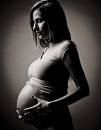He is joined by Professor Tina Beattie (director of the Digby Stuart Research Centre for Catholic Studies at Roehampton University here in the UK).
I don't read or buy 'The Tablet'ever since I read that Padre Pio said that many souls go to hell for reading bad books. Since The Tablet has been dissenting publicly on pretty much everything the Church teaches for all of my lifetime it is as bad as a book can get. So the quotes from the article have been taken from Catholic and Loving it.
But trying to muddy the waters on abortion is beyond even their usual heresy. As a woman who lost a child in an ectopic pregnancy, I am deeply offended that they would use this type of situation - a pregnancy which could endanger the Mother's life - as a justification of abortion. Explaining the Church's position Tina Beattie writes:
"So, a procedure could be performed with the intention of saving a mother’s life which indirectly caused the death of the foetus (for example, by removing the cancerous womb of a pregnant woman), but the direct, intentional killing of the foetus can never be condoned, even to save the mother’s life."
But she goes on to say,
"This kind of argument may appeal to those who value moral absolutes over ambiguity, but many of us regard dilemmas such as the one confronting Sr Margaret [a Catholic Nun in the USA who agreed to allow an abortion to be performed in her Catholic Hospital where a woman's life was deemed to be at risk]and her colleagues as being too complex for formulaic judgements.
The intention in this case was not to kill the child but to save the mother, and some may regard the distinction between directly and indirectly destroying the foetus as of little ethical relevance in situations of such tragic complexity."
The key word in all this is "killing". In any of the cases in a pregnancy where the Mother is genuinely in danger of death, the Church permits the removal of the baby where no other safe course can be found to protect Mother AND child. However, there is a world of difference between a doctor doing their best to safely deliver a child and treating that child with respect whether he or she survives or not and the alternative, a doctor tearing a baby limb from limb in it's Mother's womb. That is never ever necessary. Never. One method involves killing a child. The other involves the child dying despite the doctor's best efforts and against his intention.
When I went through an ectopic pregnancy I was told there were two ways to treat this. One is to remove the part of the fallopian tube where the baby is stuck, bringing the baby with it. The tiny baby cannot survive. The second method is to pour chemicals into the tube, which will "dissolve" (their euphemism) the baby. It's not hard to see why the Church accepts the first method and rejects the second; the tube itself is removed, that is the aim of the operation - to remove a damaged bodily organ which is in danger of rupture - the baby's life itself is not the target of the doctor's work. In the chemical method however the chemicals poured into the tube to remove the baby do not offer proper human respect to a tiny life created in God's image. What did suprise me was that each of the five doctors I spoke to about the procedure assured me that the removal of the tube was far safer and less likely to cause future problems than the chemical method. No matter how the world tries to persuade us otherwise, God's Will is, of course, never in conflict with scientific truth.
If you are a regular Tablet reader I am asking you to consider stopping reading The Tablet. If you are a subscriber, please consider cancelling your subscription. It is time to witness to the Editor and staff that we don't support this attack on human life which may confuse many Catholics, and may even result directly in abortions.
Meanwhile, if you have any doubts about the Church's teaching on abortion, read on:
“Therefore, by the authority which Christ conferred upon Peter and his Successors, and in communion with the Bishops of the Catholic Church, I confirm that the direct and voluntary killing of an innocent human being is always gravely immoral. This doctrine, based upon that unwritten law which man, in the light of reason, finds in his own heart (cf. Rom 2:14-15), is reaffirmed by Sacred Scripture, transmitted by the Tradition of the Church and taught by the ordinary and universal Magisterium.
“The deliberate decision to deprive an innocent human being of his life is always morally evil and can never be licit either as an end in itself or as a means to a good end. It is in fact a grave act of disobedience to the moral law, and indeed to God himself, the author and guarantor of that law; it contradicts the fundamental virtues of justice and charity. ‘Nothing and no one can in any way permit the killing of an innocent human being, whether a fetus or an embryo, an infant or an adult, an old person, or one suffering from an incurable disease, or a person who is dying. Furthermore, no one is permitted to ask for this act of killing, either for himself or herself or for another person entrusted to his or her care, nor can he or she consent to it, either explicitly or implicitly. Nor can any authority legitimately recommend or permit such an action’” -Paragraph 57 Evangelium Vitae, Pope John Paul II.
Clare McCullough






No comments:
Post a Comment